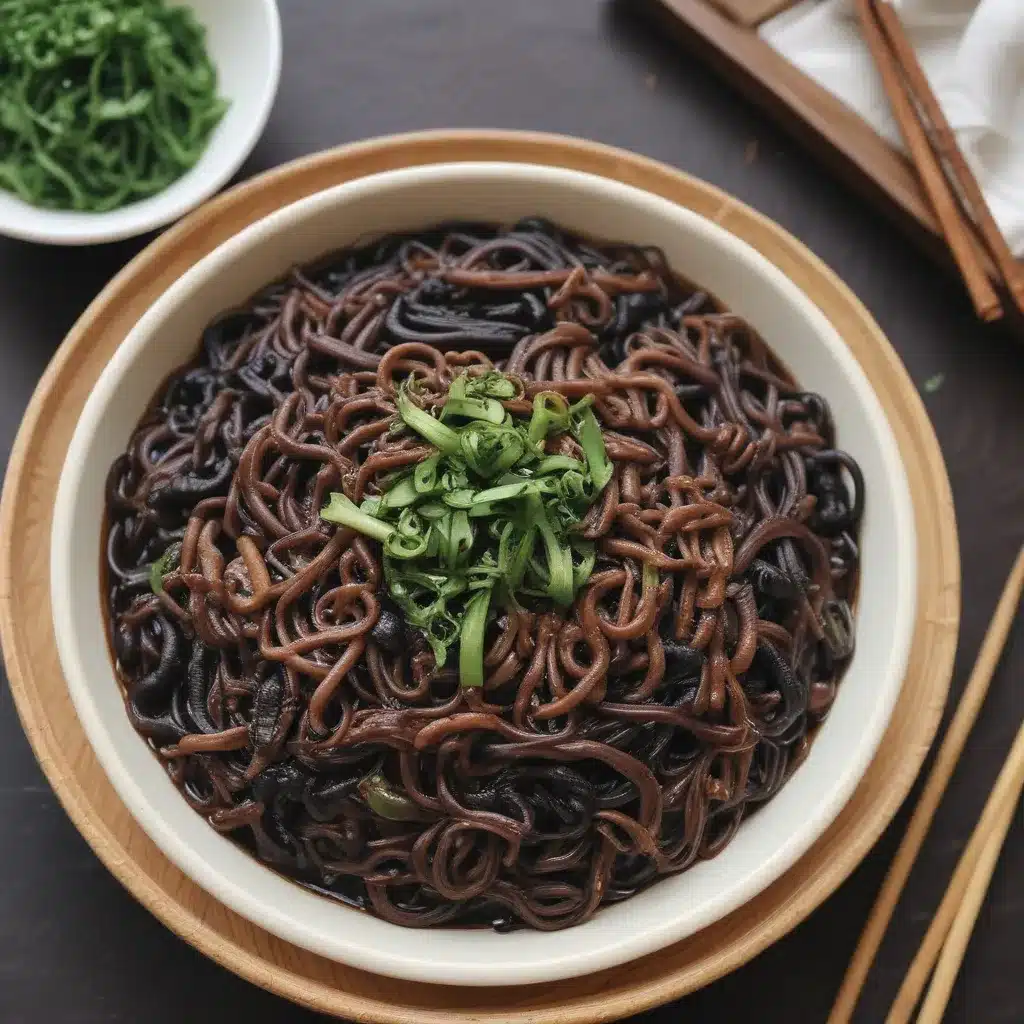
Jajangmyeon: The Beloved Black Bean Noodle Dish
As a child growing up in Seoul, I can still vividly remember the first time I tasted jajangmyeon. It was a rainy afternoon, and the aroma of savory black bean sauce wafted through the air, beckoning me to the small Korean-Chinese restaurant down the street. From the moment I took that first, heavenly slurp, I was hooked. The chewy noodles, the robust umami flavors, the satisfying heft of the dish – it was like nothing I had ever experienced before. [1]
Jajangmyeon, or Korean black bean noodles, is a beloved staple of Korean-Chinese cuisine. Originating from the Shandong province of China, this iconic dish made its way to Korea in the late 19th century, where it was quickly embraced and adapted to local tastes. [2] The key to a truly exceptional jajangmyeon lies in the sauce – a complex blend of fermented black beans, onions, pork, and a host of aromatic spices that come together in perfect harmony. [3]
While the traditional recipe is a delicious delight, creative chefs have also put their own unique spins on this classic. From vegan versions made with plant-based meat substitutes to old-fashioned renditions featuring hefty chunks of pork, the variations are endless. [4][5] No matter which iteration you prefer, one thing is certain: jajangmyeon is a dish that has the power to transport you straight back to the bustling streets of Seoul, where the sights, sounds, and flavors of this culinary icon are forever etched in the hearts and memories of those who have had the privilege to savor it.
Tangsuyuk: The Sweet and Sour Pork Sensation
If jajangmyeon is the yin to Korean-Chinese cuisine, then tangsuyuk is most certainly the yang. This sweet and sour pork dish is a beloved classic that has been gracing the tables of Korean-Chinese restaurants for generations. [3] Growing up, I always looked forward to the special occasions when my family would treat us to a feast of tangsuyuk, jajangmyeon, and the equally iconic jjamppong (spicy seafood noodle soup). [6]
Tangsuyuk, with its perfectly crispy pork, tangy-sweet sauce, and vibrant array of vegetables, is a true masterpiece of balance and flavor. The secret to its success lies in the preparation of the meat – a technique that involves soaking the pork in a potato starch and water mixture, which creates an unparalleled crispiness that holds up even when smothered in the sauce. [8] This attention to detail is what sets tangsuyuk apart, transforming a simple dish into a culinary experience that is both familiar and extraordinary.
While the traditional version is a delight, creative chefs have also put their own unique spins on this classic. From vegan iterations made with plant-based protein to old-fashioned renditions featuring giant, plate-sized portions, the possibilities are endless. [3] No matter which version you try, one thing is certain: tangsuyuk is a dish that embodies the very essence of Korean-Chinese cuisine – a harmonious fusion of flavors, textures, and cultural influences that come together to create something truly special.
Embracing the Classics in Boston
As a proud Korean-American, I’ve always been on a mission to share the wonders of my culinary heritage with the world. And what better place to do that than in the vibrant, foodie-centric city of Boston? [7] Whether you’re a lifelong fan of Korean-Chinese cuisine or a curious newcomer, the opportunity to savor the timeless classics of jajangmyeon and tangsuyuk is just a short trip away.
So the next time you find yourself craving a taste of Seoul, remember that the flavors you seek are right here in Boston, waiting to transport you on a delicious journey through the rich tapestry of Korean-Chinese culinary history. Who knows, perhaps your first encounter with these beloved dishes will be the start of a lifelong love affair, much like mine. The only way to find out is to dive in, fork in hand, and let the magic unfold.
References:
[1] Knowledge from https://www.instagram.com/ms.ahuja/reel/C6ZCxCsO-LC/
[2] Knowledge from https://www.reddit.com/r/KoreanFood/comments/1c50aie/amazing_korean_food_in_maryland/
[3] Knowledge from https://seonkyounglongest.com/tangsuyuk/
[4] Knowledge from https://secretnyc.co/octo-nyc/
[5] Knowledge from https://theculinarycolloquy.wordpress.com/2018/08/18/reviews-china-pearl-koramangala/
[6] Knowledge from https://chefchrischo.com/korean-sweet-and-sour-pork-tangsuyuk/
[7] Knowledge from https://sincerelyloewe.com/tag/seoul/
[8] Knowledge from https://chefchrischo.com/author/teamuser/page/6/
